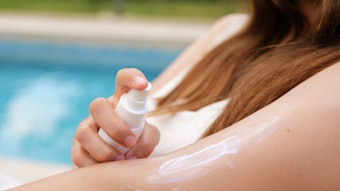As part of the new partnership between Unilever U.S. and the Fashion Institute of Technology (FIT), students graduating in 2014 from FIT's Cosmetics and Fragrance Marketing and Management (CFMM) master's degree program debuted their Capstone research projects and presentations on Wednesday, June 6, 2014 at the Haft Auditorium at FIT in New York.
The "Evolution of the Beauty Landscape" was the focus for the 2014 Capstone event, as the FIT students explored the topic "The Changing Face of the Beauty Consumer." Under this theme, they researched three challenges that shape the way beauty companies operate, from economics to gender to ethnicity.
"Accessible Beauty"—"Accessible Beauty" introduces a new name for a growing consumer group: Progressive Rationalists. This group regularly trades up and down, necessitating a different approach for reaching them.
- Findings:
- By 2030, there will be a 50% decline in global poverty, leading to strong middle class consumerism.
- Asia will surpass the U.S. and Europe in GOP, population, military spending and technology investment.
- Global migration will increase due to an aging population in developed countries.
- Recommendations:
- The industry should adopt a new model called Progressive Consumption Equation: [function + higher order need] + performance = purchase.
- Brands must focus on three higher order needs:
- Convenience—Brands need to be hyper accessible by empowering local consumers to become points of distribution, utilizing the franchise method of "buying in."
- Clarity—Brands need to leverage radical transparency, from philanthropy to profits to resources.
- Cash—Brands must help consumers save money by developing the next generation of private label products everywhere consumers shop, without risking brand image.
"Engaging the New Beauty Consumer"—"Engaging the New Beauty Consumer "presents a new strategy that leverages total consumer identity. This new strategy moves beyond the traditional segmentation model of race, sex, age, and geography.
- Findings:
- By 2030, race will transform into cultural values. The U.S. will no longer be a melting pot, but a mosaic of mixed ethnicity creating individual ethnicities.
- The range of gender identities will significantly broaden. Even today, Facebook offers 56 options for gender.
- Age will evolve into cross-generational passions. By 2050, people ages 65 and over will outnumber the young, and age will no longer define product need.
- Geographic borders will no longer limit the definition of community. Instead, connections, intertwined with community, will define geography.
- Recommendations:
- Brands must implement four key strategic initiatives:
- Exchange—Establish a cultural exchange between brand values and consumer values.
- Individual Reality—Connect with consumers' key personal moments throughout the year, not only on national holidays.
- Connectivity—Become part of a consumer's unique community by leveraging technology and data to deliver a real and personalized experience.
- Organizational Framework—Ensure that all marketing and sales teams have access to and responsibility for consumer insights.
- Brands must implement four key strategic initiatives:
"Men's Beauty"—"Men's Beauty" explores the increasing complexity that modern men encounter in today's society. The research focuses on the changing economic and social attitudes toward masculinity that are impacting male grooming habits. The industry is at a tipping point where external drivers are altering men's wants, needs, and aspirations.
- Findings:
- Changing Roles—Three out of four men agree that men and women no longer need to conform to traditional roles and behaviors.
- Changing Views—76% of men agree that males are under more pressure than past generations to present a polished image.
- Changing Faces—Population growth for the older male segment, combined with millennial men being more accepting of women's grooming products and routines, will positively impact product adoption and usage.
- If brands are able to increase men's yearly product purchases from five to seven items at an average of $10 each, the U.S. market could reach $10 billion by 2030, 30% higher than currently projected.
- Recommendations:
- A four-gear approach is critical to men's grooming, each one representing a network of interdependent action:
- Ignite—Identify authentic needs and genuine consequences by introducing credible, simple solutions.
- Steer—Leverage key influencers and focus on ease, accessibility, and trust.
- Fuel—Utilize imagery and communications reflective of the dynamic state of masculinity.
- Accelerate—Focus on one hero product at a time, building momentum, sophistication, trust, and loyalty over time.
- A four-gear approach is critical to men's grooming, each one representing a network of interdependent action:
"At Unilever, we deliver world class innovation based on rich insights that create meaningful connections with our consumers, and we know that what's relevant today may not be tomorrow as demographics continue to evolve," said David Rubin, marketing vice president, Unilever Hair US. "The dynamic and intelligent graduate students of FIT's Cosmetics and Fragrance Marketing and Management Master's Program have come together to take on imminent challenges of the business, such as 'The Changing Face of the Beauty Consumer.' We at Unilever are honored to partner with FIT to help foster the growth of these prospective industry leaders."
"Working with a world class consumer packaged goods company like Unilever as partner, the faculty and class of 2014 were excited to explore the consumer of 2030, and how evolving cultural values, universalization, changing notions of life stage and gender, and the rapidly changing socioeconomic landscape globally will impact on how brands innovate and communicate to connect with their consumers," said Professor Stephan Kanlian, chair of FIT's unique graduate program. "We are truly at a tipping point, with the convergence of social conscience in the developed markets and the rising global middle class in the developing world, and these forces are sure to effect widespread changes in the consumer landscape of 2030."
The CFMM master's degree program provides advanced education for emerging beauty industry executives. Each year the graduating class presents in-depth, forward-thinking capstone research along with industry predictions and proposals for beauty companies. Full research white papers for "The Changing Face of the Beauty Consumer," along with white papers for past presentations, are available at fitnyc.edu/5518.asp.










